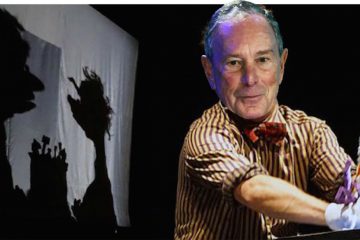Don’t Let Mike Bloomberg Use California to Win the Nomination
 While a lot of the online left has trained its ire on Mayor Pete Buttigieg, the biggest revelation of the Democratic primary pertains to a different mayor. It turns out that Michael Bloomberg, who only apologized in November for his mayoral administration’s 12-year history of favoring invasive and unconstitutional stop-and-frisk policies by the cops, contracted with a third-party vendor to use Oklahoma prison labor to make campaign calls.
While a lot of the online left has trained its ire on Mayor Pete Buttigieg, the biggest revelation of the Democratic primary pertains to a different mayor. It turns out that Michael Bloomberg, who only apologized in November for his mayoral administration’s 12-year history of favoring invasive and unconstitutional stop-and-frisk policies by the cops, contracted with a third-party vendor to use Oklahoma prison labor to make campaign calls.
The Intercept broke the story on Christmas Eve, a date associated with changes of heart by miserly bosses. Although the exact amount prisoners earned is in doubt — it’s still definitely less than $1 per day, per state Department of Corrections policy — the 77-year old Bloomberg is the eighth-richest American, worth $54 billion.
This frugal investment is part of a strategy to pour unprecedented sums into the race for the Democratic nomination, which somehow still contains 15 candidates and a great deal of flux. He’s spent $100 million, far more than everyone else — even fellow billionaire Tom Steyer.
The Iowa caucuses fall on Feb. 3, 2020, and New Hampshire is just after that, and Bloomberg is polling at negligible levels in both, so this is the equivalent of Panic Saturday shopping. His strategy appears to be something like “Effectively skip both early contests while dumping incalculable sums into every other race to sow enough chaos as to halt the winners’ momentum, then capitalize on that instability.”
In other words: disruption. The hawkish, pro-surveillance state, Wall Street apologist and friend of Crown Prince Mohammed bin Salman, who ran as a Republican and governed as a Republican for the first half of his mayoralty, wants to disrupt the primary like some feisty startup. (He actually has a startup of sorts, a secretive “digital agency and tech services provider for campaigns” called Hawkfish, which seems like double-dealing and also a response to this guy.)
And there is a gaping void in the Democratic primary giving him an opportunity: California. With Sen. Kamala Harris having dropped out, and the state’s primary date advanced from June 7 to join the Super Tuesday crowd on March 3, the state is strategically important like never before — and wide open. Former Vice President Joe Biden holds a miniscule lead over Sen. Bernie Sanders, and while Bloomberg is in fifth place with 4.8 percent, that’s more than double his 2 percent level in Iowa.
Given his deep pockets, that’s kind of ominous. Bloomberg can sit back as one former front-runner after another implodes, blanketing the airwaves with reminders of his invincibility and amassing delegates through a sort of passive, even genial, scorched-earth approach. Undoubtedly, a big chunk of Democratic primary voters is so terrified of a second Trump presidency they’ll support whoever they think can vanquish him in November, irrespective of that person’s politics. Opportunistic party affiliation be damned, Bloomberg is hardly unelectable: Progressive-leaning New York City voted him into office three times before supporting Hillary over Trump 80-17. And as the owner of a large media company, he doesn’t like journalistic independence if it means unfavorable coverage of himself.
Granted, the risk is obvious. A target audience largely comprised of liberals doesn’t seem super-duper enthusiastic about a billionaire buying the presidency, and a lot has changed since he last ran for office in 2009. Bloomberg’s candidacy could very well become the biggest waste of money in history.
But he’s playing it smart. He spent $110 million to help Democrats in the midterms, and that can buy you a lot of love. His key progressive ideas are gun control and halting climate change, things Californians support. He’s courting former Gov. Jerry Brown and successfully wooed up-and-coming technocrats, like Stockton’s 29-year-old mayor Michael Tubbs — who, as a Black man leading a struggling city, could be a potent ally. As of now, it’s not so much that Bloomberg is disliked as much as little-known, and the types of voters he’s likely to attract (older, whiter, more moderate, financially more comfortable) are the people who reliably show up to vote. There is a pathway to victory there.
Michael Bloomberg is not here to inspire, but to reassure. And these are terrifying times. But the mere existence of billionaires is fundamentally corrosive to public trust in a society that desperately needs it. They’re prone to monarchical impulses, they hate the rules, and they have absolutely no idea how life works for regular people. Let’s not let him win this thing by using California.








